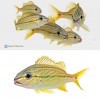Abstract
Grunts (family Haemulidae) are some of the most economically and ecologically important fishes found throughout the world. Their common name refers to the characteristic grunting sound they make when they are agitated and during courtship. Many species of grunts are popular in public and private aquariums due to their schooling behavior and bright colors that create interest in aquarium exhibits. The French grunt has recently been identified as a candidate species for aquaculture due to its popularity in aquarium displays and the development of culture protocols. This 4-page fact sheet was written by Kevin P. Barden, Matthew L. Wittenrich, and Eric J. Cassiano, and published by the UF Department of Fisheries and Aquatic Sciences, March 2014.
References
Burke, N.C. 1995. Nocturnal foraging habitats of French and bluestriped grunts, Haemulon flavolineatum and H. sciurus, at Tobacco Caye, Belize. Environmental Biology of Fishes. 42(4): 365-374. https://doi.org/10.1007/BF00001467
Cassiano, E.J., Ohs, C.L., Hill, J.E. 2009. Candidate species for Florida aquaculture: pigfish, Orthopristis chrysoptera. Program in Fisheries and Aquatic Sciences, SFRC, Florida Cooperative Extension Service, Institute of Food and Agricultural Sciences, University of Florida, Gainesville, FL. http://edis.ifas.ufl.edu/fa160 (accessed June 17, 2013). https://doi.org/10.32473/edis-fa160-2009
Cassiano, E.J., Wittenrich, M.L., Violetta, G.C., Watson, C.A. 2012. Growth and survival of porkfish (Anisotremus virginicus) larvae: comparing rotifers and copepod nauplii during first feeding. Animal Biology & Animal Husbandry 4(2): 72-78.
de la Morinière, E.C., Pollux, B.J.A., Nagelkerken, I., van der Velde, G. 2002. Post-settlement life cycle migration patterns and habitat preference of coral reef fish that use seagrass and mangrove habitats as nurseries. Estuarine, Coasta and Shelf Science 55(2): 309-321. https://doi.org/10.1006/ecss.2001.0907
FWRI (Fish and Wildlife Research Institute), Florida Fish and Wildlife Conservation Commission. 2010. Grunts: 86-92. Pdf: http://myfwc.com/media/194701/grunts.pdf
Hargrove, J.S., Parkyn, D.C., Murie, D.J., Demopoulos, A.W., Austin, J.D. 2012. Augmentation of French grunt diet description using combined visual and DNA-based analyses. Marine and Freshwater Research 63: 740-750. https://doi.org/10.1071/MF12099
Lieske, E., Myers, R. 1994. Collins pocket guide. Coral reef fishes. Indo-Pacific & Caribbean including the Red Sea. Haper Collins Publishers, 400 p.
Nelson, J. 2006. Fishes of the world (Fourth ed.). John Wiley & Sons, Inc., Hoboken, New Jersey, 601 pp.
Randall, J.E. 1967. Food habits of reef fishes of the West Indies. Studies in Tropical Oceanography 5: 665-847.
Robertson, D.R., Green, D.G., Victor, B.C. 1988. Temporal coupling of production and recruitment of larvae of a Caribbean reef fish. Ecology 69(2): 370-381. https://doi.org/10.2307/1940435
Verweij, M.C., Nagelkerken I., Wartenbergh, S.L., Pen, I.R., van der Velde, G. 2006. Caribbean mangroves and seagrass beds as daytime feeding habitats for juvenile French grunts, Haemulon flavolineatum. Marine Biology 149(6): 1291-1299. https://doi.org/10.1007/s00227-006-0305-5
Wittenrich, M.L., Cassiano, E.J., Boles, L.D., Barden, K.P., Knight, S., Stamper, M.A., and Watson, C.A. Accepted. Larval development, growth and survivorship of French grunt, Haemulon flavolineatum: comparing rotifers and copepod nauplii during first feeding. Journal of the World Aquaculture Society.

